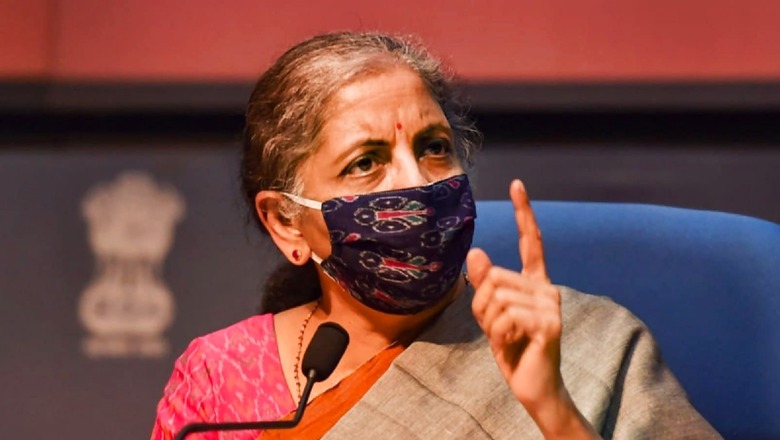
views
GST Council Meeting Updates: The 45th Goods and Services Tax (GST) Council meet, the first in-person meeting in nearly two years, has started in Lucknow on Friday. From bringing petroleum products under the ambit of GST to extending the GST exemption on Covid-essential items, there has been a host of issues that are going to be discussed in the GST Council meeting on September 17. The Council will also likely to deliberate compenstation to states, rationalisation of an inverted duty structure on the supply chain of certain items among others.
“The GST council meeting this time would be a physical one, the first post the outbreak of the pandemic. The news about the discussion of including petroleum products under GST has increased the attention. Considering the fact that it’s a highly contentious issue due to its severe impact on the finances of both the states and the centre, no major decision is expected in this regard. The modalities of extending the compensation cess beyond 2022 are expected to be finalised during the meeting,” said Divakar Vijayasarathy, founder and managing partner, DVS Advisors LLP.
“Other key points that would be decided upon are launching of common portal both for registration and payment of taxes, inverted duty on certain products and other recommendations of GOM,” he added.
Compensation to State: New Formula?
The Centre on Friday is likely to discuss the modalities of extending the compensation cess and revenue shortfall to the states due to Covid-19 pandemic. During the inception of GST, the Centre had promised that it would compensate the state for any revenue loss in the first five years, starting July 1, 2017. In October 2020, the GST Council had agreed, in principle, to extend the compensation beyond the original five years. The GST Council has calculated the shortfall assuming a 14 per cent annual growth in GST revenue over the base year of 2015-16. This validity of compensation following the old formula was till June. The GST Council meeting is likely to discuss the new formula to compensate the state beginning from July.
“Considering that the pandemic is not yet over and States are still ramping up healthcare infra, it is possible that tax concessions given in the last year will be extended for some more time,” said Shashi Mathews, partner, Induslaw.
Petrol, Diesel Under GST
After almost four years of its implementation, the Council likely to discuss bringing the auto fuel under the ambit of GST on Friday. Petrol and diesel prices are at record high in the country. Earlier, Kerala High Court issued a directive mentioning petrol and diesel should be included in GST considering the skyrocketing rates. The GST Council may discuss levying GST on petroleum crude, high speed diesel, motor spirit (petrol), natural gas and aviation turbine fuel (ATF), according to sources. However, experts say it will be a tough call to include petrol under GST.
Concession on Covid-19 drugs
The 45th GST Council Meetting likely to deliberate the proposal of extending concession on Covid-19 drugs till the year-end. The Union government is likely to extend the concession on Amphotericin B, Tocilizumab, Remdesivir and anti-coagulants like Heparin, till December 31, 2021, from the present September 30. In the wake of Covid-19 pandemic, the GST rate on Amphotericin B, Tocilizumab was cut to zero, while Remdesivir and Heparin was reduced to 5 per cent in June 2021.
The council will also discuss the proposal of reducing GST from 12 per cent to 5 per cent to the seven more drugs — Itolizumab, Posaconazole, Infliximab, Bamlanivimab and Etesevimab, Casirivimab and Imdevimab, 2-Deoxy-D-Glucose and Favipiravir. The GST Council has already approved this proposal, sources told News18.
GST on Zomato, Swiggy and other food delivery providers
Do you have to pay more from now on while ordering food via Zomato and Swiggy? The GST Council on September 17 is likely to discuss whether the food delivery platforms like Swiggy and Zomato are liable to pay the Goods and Services Tax on restaurant services supplied through them.
“Proposal to include e-commerce companies like Zomato and Swiggy in the definition of restaurant services should be carefully considered and discussed with industry in detail before implementation. The preposition may look good from ease of administration side but could lead to issues in compliance for the restaurants and e-commerce companies. How will the small eateries continue with their exemptions or who will claim the ITC of inputs are few important aspects to be kept in mind,” said Jatin Arora, partner, Phoenix Legal.
Inverted Duty Structure
The Supreme Court has recently upheld the restriction on refunds under inverted duty structure only to the extent of input goods credit. The Apex Court has recognised that there is an anomaly in the formula for quantum of refund. It also directed the GST Council to consider fixing the anomaly explained
Arora, partner, Phoenix Legal.
“It is essential to overcome the challenges arising from the inverted duty structure on certain products, in addition to extending relief for pharma products required for treatment of Covid patients,” said MS Mani, senior director, Deloitte India.
Treatment of intermediaries is also on the agenda, given its adverse impact and challenges to its very constitutional validity, one hopes that taxpayers’ concerns get addressed. Similarly, industry will look forward to a conclusion apropos levy of interest on wrongful claims of input tax crediThe proposedsed levy of 5 per cent GST on cloud kitchens is likely to go through,” said Sudipta Bhattacharjee (partner), Khaitan & Co.
Read all the Latest News , Breaking News and Ukraine-Russia War Live Updates here.




















Comments
0 comment